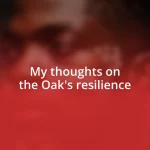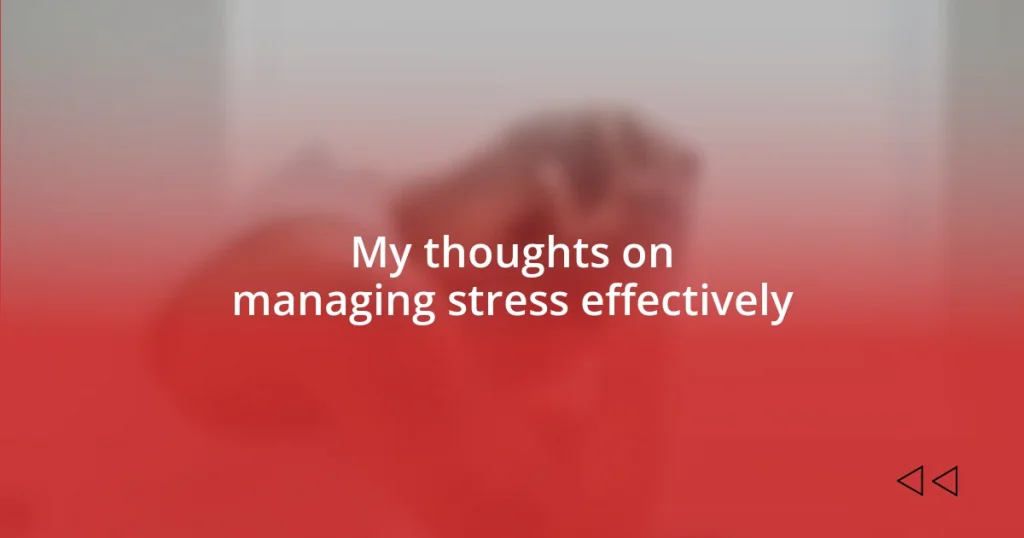Key takeaways:
- Understanding stress as a physiological and emotional response highlights the importance of identifying triggers to manage it effectively.
- Implementing practical techniques like deep breathing, mindfulness, and establishing a routine can significantly alleviate stress levels.
- Building a support system through relationships and community engagement fosters connection and provides emotional relief during stressful times.
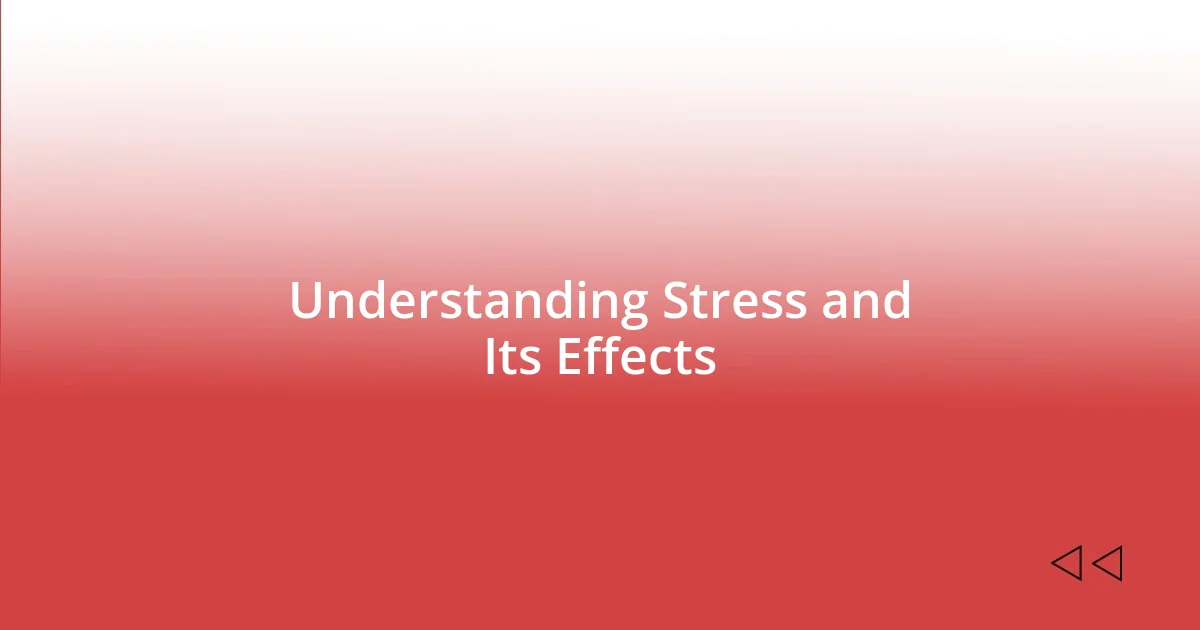
Understanding Stress and Its Effects
Stress is more than just a feeling; it’s a physiological response that can take a real toll on our bodies. I remember a time when I was overwhelmed with work deadlines. My heart raced, my muscles tensed, and I found myself unable to focus. It was like my mind was stuck in a loop of worry. Isn’t it fascinating how our body can react so intensely to our mental state?
The effects of stress can manifest in many ways—physically, emotionally, and even socially. I’ve noticed that during particularly stressful periods, I tend to withdraw from social activities, which only adds to the feelings of isolation. When was the last time you felt overwhelmed and chose to stay home rather than connect with friends? In those moments, it’s easy to overlook the importance of human connection in combating stress.
Stress can also lead to long-term psychological issues if left unaddressed, like anxiety and depression. I once went through a phase where constant stress made getting out of bed feel like a monumental task. It’s a stark reminder that our emotional wellness is intricately tied to how we manage stress. Have you experienced similar feelings? Recognizing the signs early on can make all the difference in how we cope and ultimately thrive.
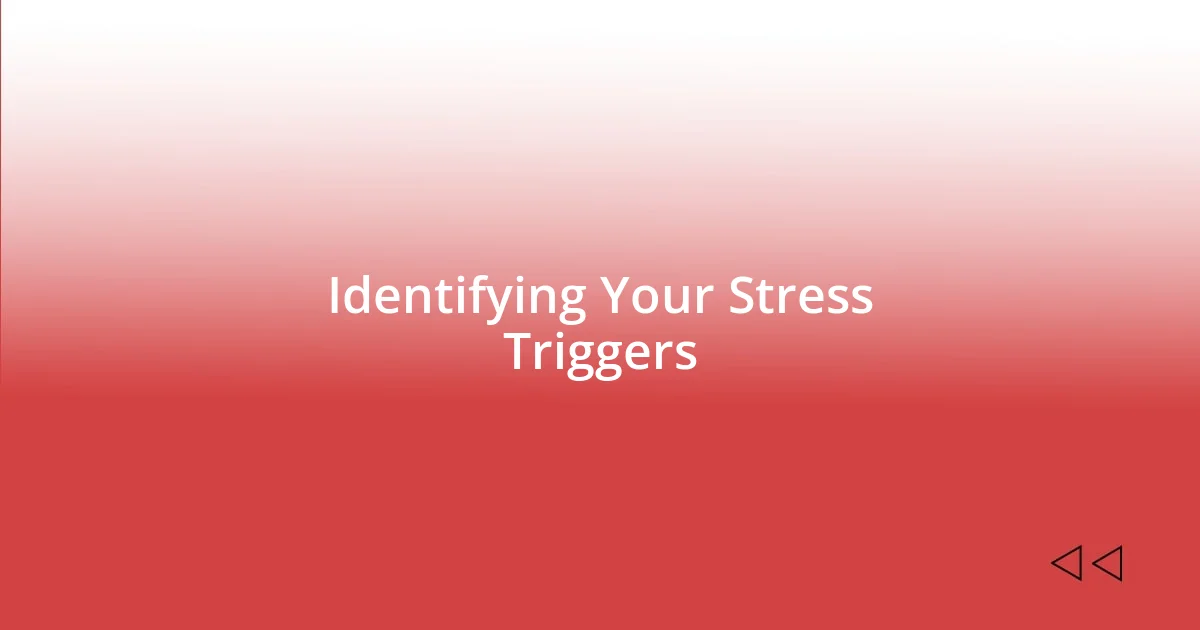
Identifying Your Stress Triggers
Identifying your stress triggers is a vital step towards managing stress effectively. I learned this firsthand during a particularly hectic period at work. Certain tasks, like back-to-back meetings, consistently left me feeling drained and anxious. By taking note of those moments, I began to understand the specific situations that escalated my stress levels. Have you noticed patterns in your day that contribute to how stressed you feel?
Tracking stress triggers doesn’t have to be complex. It can be as simple as keeping a journal to jot down moments that make you feel overwhelmed. I found that even writing down my triggers helped me feel more in control. I started noticing how specific interactions with certain colleagues would leave me feeling unsettled, prompting me to prepare mentally for those meetings. What about you? Have you ever considered how a simple log could reveal your stress hot spots?
Recognizing these triggers is just the beginning. Once I identified mine, I could explore strategies to cope, whether it meant setting boundaries at work or incorporating brief mental breaks throughout my day. Reflecting on those insights allowed me to approach stressful situations with more clarity. Isn’t it empowering to think that understanding what stresses you can lead to effective solutions?
| Common Stress Triggers | Personal Experience |
|---|---|
| Work Deadlines | Feeling overwhelmed and anxious when tasks pile up. It helped me prioritize effectively. |
| Conflict with Colleagues | Certain interactions would leave me unsettled, spotlighting the need for better communication. |
| Personal Responsibilities | Juggling family commitments sometimes feels like a tightrope walk; recognizing it aids in planning. |
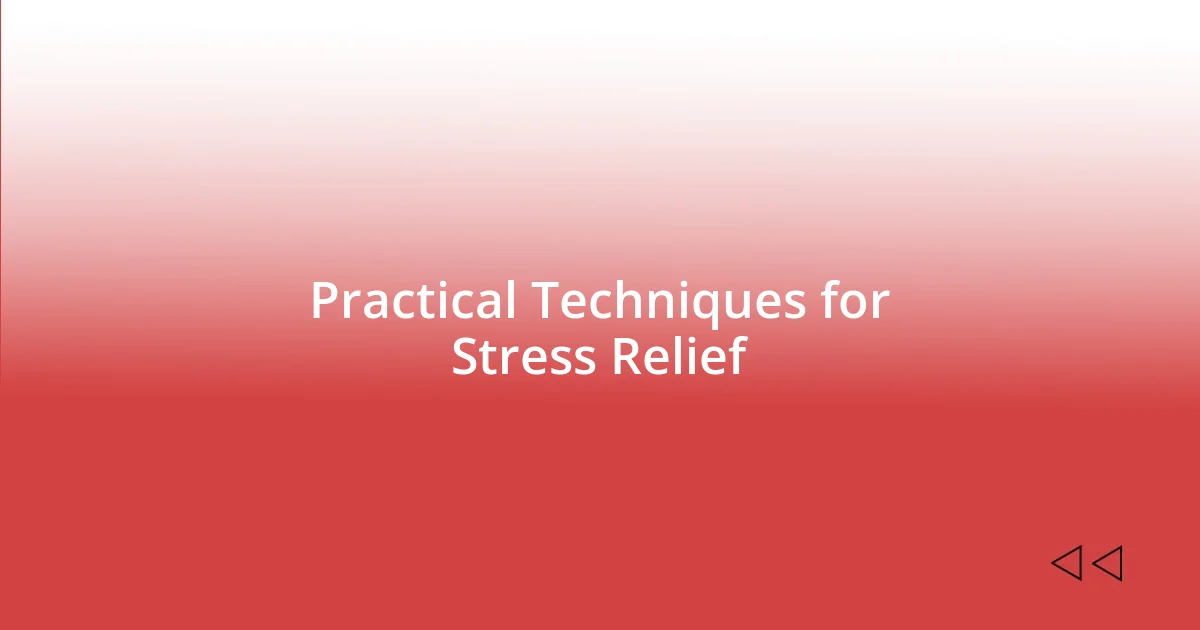
Practical Techniques for Stress Relief
When it comes to stress relief, I’ve found that establishing a routine can work wonders. Some days, I try starting my morning with a simple 10-minute meditation. It’s incredible how just a few moments of deep breathing can shift my entire mindset. It’s almost like hitting the reset button on my day, allowing me to tackle challenges with a clearer head.
- **Deep Breathing:** Taking slow, deep breaths can calm the nervous system, making it a quick and effective technique.
- **Mindfulness Meditation:** Spending a few minutes focusing on the present moment can reduce anxiety and improve overall mental clarity.
- **Physical Exercise:** Even a brisk walk or a short workout can release endorphins, boosting my mood significantly.
- **Connection with Nature:** I often step outside for fresh air and a change of scenery, which grounds me and clears my head.
- **Creative Outlets:** Whether it’s drawing or writing, expressing myself creatively always brings me peace during stressful times.
Another effective approach I’ve turned to is the art of journaling. Whenever I feel overwhelmed, I take a few minutes to jot down my thoughts and feelings. I remember one particularly hectic week where everything felt chaotic. Writing helped me process my emotions and pinpoint specific areas of stress. It felt therapeutic to release my thoughts onto paper, almost like having a conversation with myself. Isn’t it fascinating how putting pen to paper can foster such clarity?
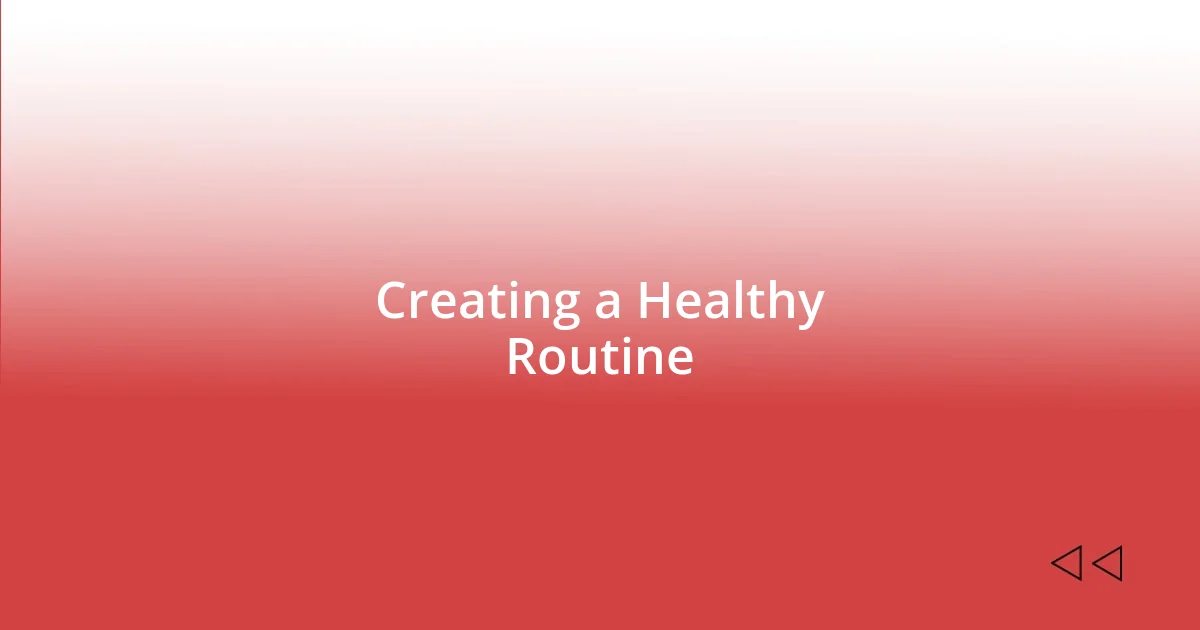
Creating a Healthy Routine
Creating a healthy routine is essential for managing stress in a meaningful way. I’ve noticed that structuring my day gives me a sense of control that can combat feelings of overwhelm. For example, I schedule dedicated times for work, exercise, and even relaxation. This way, I consistently remind myself that downtime is just as important as productivity.
In addition, I find that incorporating small, intentional rituals into my morning can drastically improve my mood. Just the other day, I decided to brew a cup of herbal tea and savor it quietly instead of rushing into my tasks. That simple act felt like a warm hug, allowing me to start my day with intention. How do you begin your day? Reflecting on that might lead to surprising changes.
One aspect of my routine that has become vital is setting boundaries around my work hours. After experiencing burnout from long hours, I now make it a point to log off by a certain time each evening. This practice not only allows me to unwind but also helps me allocate more time for hobbies and family. Have you ever thought about how a clear end to your workday could affect your overall stress levels? I can attest that it makes a profound difference in maintaining balance.
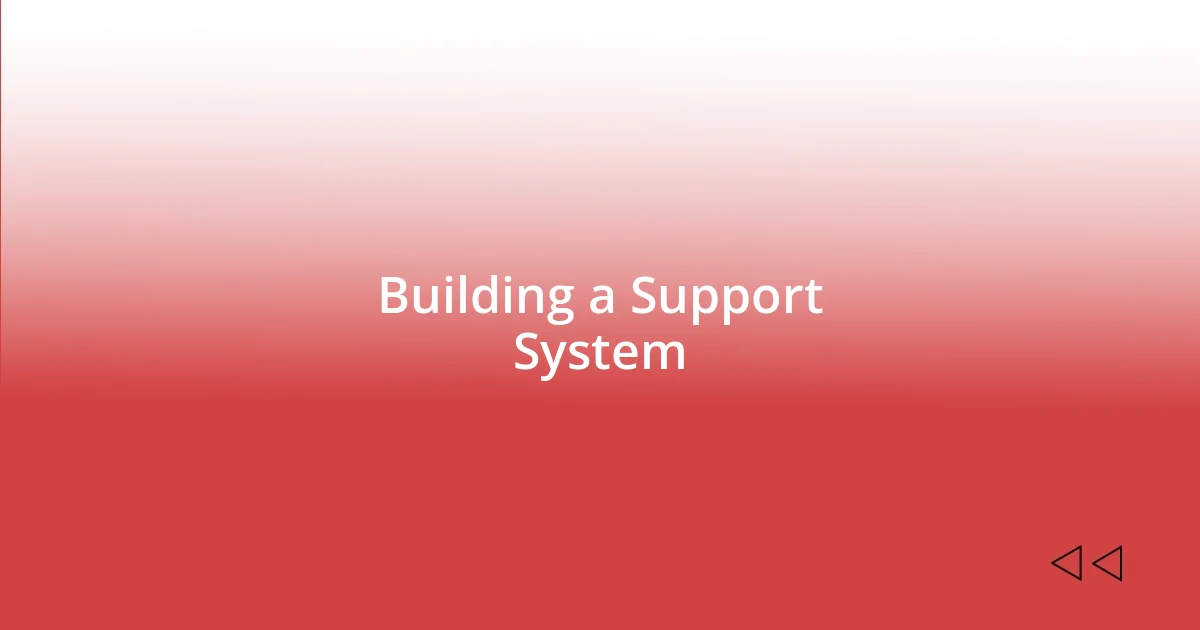
Building a Support System
Building a support system is one of the cornerstones of managing stress effectively. I remember when I was feeling particularly overwhelmed; I reached out to my close friends and family. Opening up about my struggles not only lightened my burden but also fostered deeper connections. It made me realize that I wasn’t alone in my experiences. Have you ever considered how sharing your feelings can create a sense of belonging?
Another layer to this support system is finding like-minded individuals, perhaps through community groups or online forums. I once joined a local book club, and it became a safe haven for discussing life’s ups and downs while enjoying great reads. The camaraderie and shared laughter provided a refreshing outlet that significantly alleviated my stress. It’s amazing how people who resonate with your experiences can understand and validate your feelings. Have you found similar spaces where you can connect?
Ultimately, it’s essential to nurture these relationships actively. I make it a point to check in with my friends regularly, whether through texts, calls, or in person. I often reflect on how those small gestures can strengthen our bond and create a web of support that helps both parties cope with life’s challenges. What steps are you taking to cultivate your support network? Trust me; even a little effort can lead to significant relief.
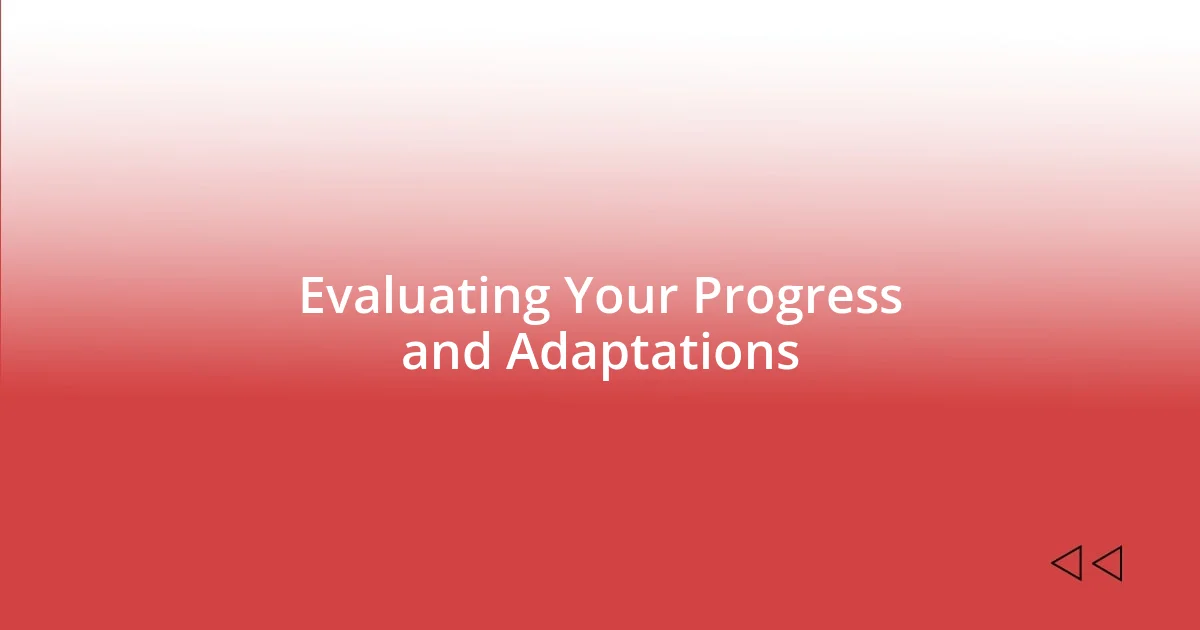
Evaluating Your Progress and Adaptations
Evaluating your progress in managing stress is a critical step that many overlook. I’ve found that taking a moment to reflect on my strategies helps me gauge what works and what needs adjustment. For instance, I keep a journal where I note my feelings and responses to stressful situations. It’s incredible how reviewing these entries lets me identify patterns and areas for growth. Have you tried documenting your experiences?
Sometimes, I hold myself accountable by setting monthly check-ins. During these sessions, I assess not just my coping mechanisms but also my emotional well-being. I remember a time when I committed to a new exercise routine, but life got busier, and I found myself skipping sessions. By being honest with myself, I realized I needed to adapt my approach, like integrating short workouts instead of longer ones. How do you hold yourself accountable for your own progress?
As part of my evaluation process, I consider my emotional adaptations. I often ask myself how certain situations made me feel and whether my reactions were in line with my goals. For example, when faced with unexpected changes, I’ve learned to embrace flexibility rather than resist it. This lesson brought a real sense of freedom. Reflecting on moments like this can reveal significant insights into your evolving relationship with stress. What changes have you noticed in your emotional responses?






